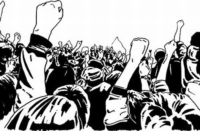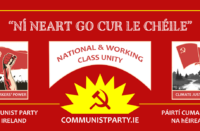Low pay is defined by the OECD as the pay of a full-time worker whose earnings are below two-thirds of a country’s median income. The proportion of workers on low pay ranges from 4 per cent in Belgium to 24 per cent in the United States.
The Republic, at 23 per cent, is the second-worst of the countries in the OECD. In the North, 21 per cent of workers are deemed to be on low pay; but this is calculated as a percentage of the median wage in Britain. If it was calculated as a percentage of the median wage in the South, nearly 30 per cent of workers in the North would be deemed to be on low pay.
Half of all workers in the North earn less than £23,043 (€27,000) a year, while in the South a similar fraction earn less than €28,500.
Trade union density is hovering around 27 per cent of all workers. Unions are severely restricted by anti-worker legislation, north and south, namely the Industrial Relations Act (1990) in the South and in the North the Trade Union Act (2016) along with its 1992 predecessor.
Low pay, falling union density and anti-union legislation are all inextricably linked, as are precarious work, minimum-hour and short-term contracts, the gig economy, and bogus self-employment, all of which have flourished as a result.
If workers are to be able to fight back, the restrictions on them and their unions under present legislation must go. It has broken the collective that was the trade union movement. The outlawing of solidarity action and support strikes for over thirty years has weakened class solidarity and pride in our unions. There was a time when all workers were proud to wear their union badge; today the sight of one on the shop floor is a rarity.
What controlled employers’ greed and secured workers their share in the past was union power and union density. Once unions were restricted by legislation, the race to the bottom began, and membership declined.
We in the trade union movement need to ask ourselves why three out of every four workers have not joined a union. Trade unions have mostly been in defensive mode for more than thirty years. This is a direct result of Thatcherite anti-union legislation in the North, the Industrial Relations Act south of the border, and social partnership.
Industrial action is at a record low point throughout the country, and all too often trade unions are not at the forefront of radical campaigning but are largely hidden in committees and lobbying halls. Members need to see their union leading the fight for their rights.
The reality is that low pay, precarious work and long waiting-lists are not confined to one jurisdiction or the other. There are crossovers between where people live and where they work, and both suffer the effects of the system equally. We need an all-Ireland Workers’ Rights Act to protect workers and tip the balance of power back towards workers to enable unions and workers to fight to improve the quality of every aspect of our lives.
A pay increase, though welcome, eases the economic burden on workers but does not give them power. A Workers’ Rights Act would include:
- the right to union recognition for all workers
- the right to union access for all workers
- the restoration of rights for individual workers
- full collective bargaining rights for all workers
- abolishing the ban on solidarity and secondary picketing
- abolishing the ban on political strikes
- abolishing the ban on sit-ins and occupations
- decisions on notice period for industrial action and the running of ballots being left to trade unions.
Any action taken in a dispute, provided it is not illegal in itself, must be free from criminal and civil liability.
Trade unions must be radical or they will become redundant!
Late news
As we go to press, the Dublin Council of Trade Unions has put the following motion forward to the ICTU biennial delegate conference at the end of the month:
“Conference recognises that the restrictions on trade union action in the 1990 Industrial Relations Act need to be opposed, and that the Act should be replaced or reformed to restore rights which trade unions had before 1990. Conference mandates the executive to seek an alternative legislative regime which would allow trade union and industrial action for individual workers, for issues that concern workers across society and across employers, and for effective solidarity to workers in dispute.”
Until unions go back to basics and are seen to be in the forefront of workers’ struggle, membership will continue to decline. Let’s hope the delegates at the ICTU conference see the writing on the wall and pass this very important Dublin Trades Council motion, or twenty years from now children will be asking, “Daddy, what’s a trade union?”
And those children will all be on poverty wages, living from hand to mouth and struggling to survive.
It is in the interests of all workers and the trade union movement that the DCTU motion gets the overwhelming support of delegates. The concern of one is the concern of all.






